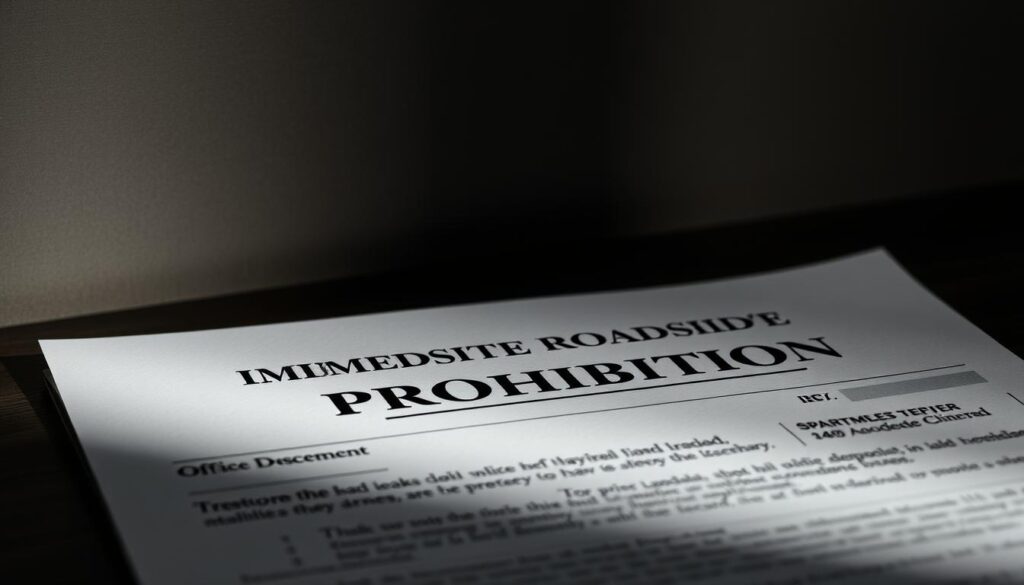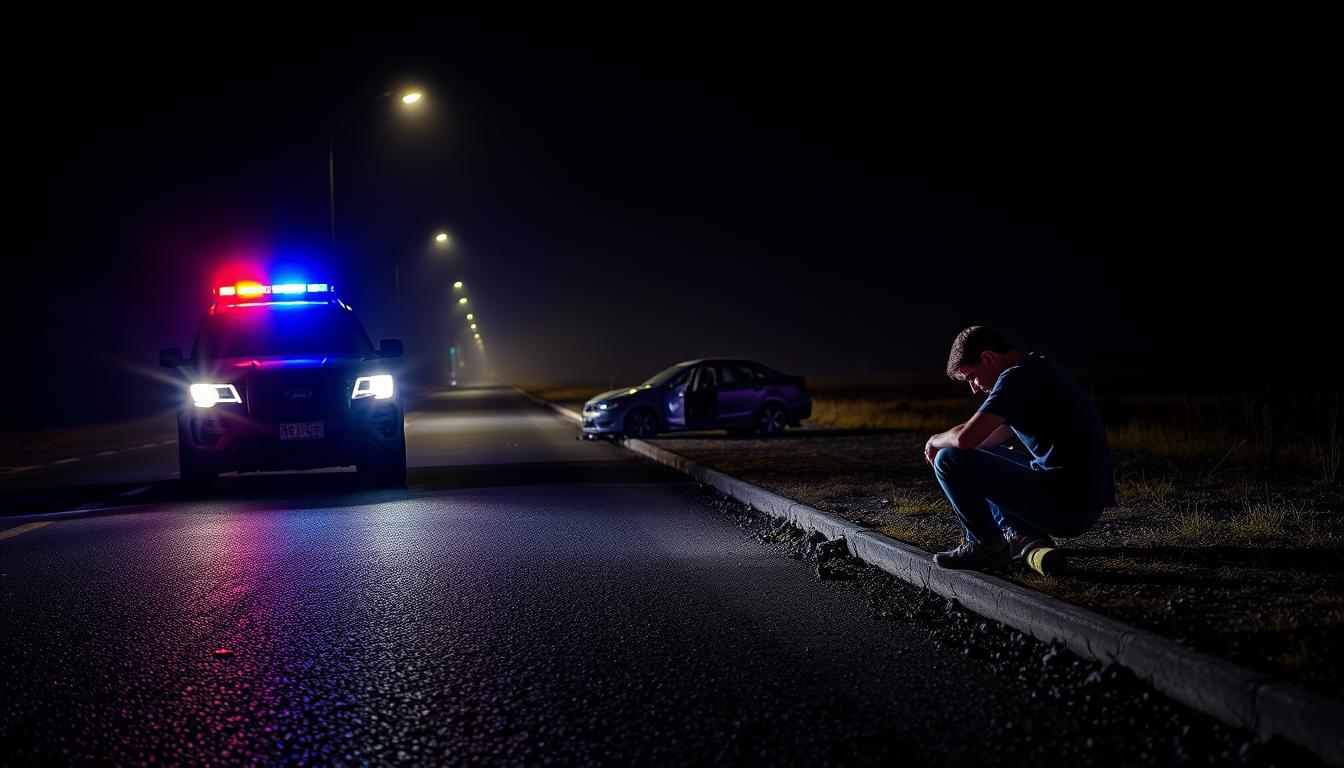Table of Contents
Did you know that in British Columbia alone, thousands of drivers face Immediate Roadside Prohibitions (IRPs) every year? An IRP is more than just a temporary inconvenience—it’s a serious administrative sanction that can have lasting consequences on your driving privileges and overall life. Issued by police for driving under the influence of alcohol or drugs, an IRP can result in vehicle impoundment, hefty fines, and even ignition interlock requirements.
The duration of an IRP varies significantly, ranging from 3 to 90 days, depending on the severity of the offence and the driver’s history. For instance, a first-time offence with a blood alcohol content (BAC) between .05 and .08 can lead to a 3-day prohibition, while a BAC of .08 or higher results in a 90-day IRP. Understanding these timelines is crucial, as the consequences extend beyond the immediate penalties.
If you’re facing an IRP, it’s important to act quickly. In Canada, particularly British Columbia, an IRP remains on your driving record permanently, unlike criminal records which can be pardoned after a certain period. This lifelong mark can impact your ability to travel, find employment, and even maintain insurance coverage. For those seeking legal guidance, the Sohi Law Group offers expert assistance and can be reached at 833-877-9797.
The financial burden of an IRP is another critical factor. Costs can escalate quickly, with a 3-day IRP costing around $600, while a 90-day prohibition can exceed $4,700. Additionally, longer prohibitions often require completing the Responsible Driver’s Program and installing an ignition interlock device, adding hundreds more to the total expense.
Given the severe and long-lasting effects of an IRP, it’s essential to address the issue promptly. With only 7 days to dispute an IRP, seeking legal advice early can make a significant difference in the outcome. The Sohi Law Group specializes in such cases and can provide the expertise needed to navigate this complex process.
In the following sections, we’ll delve into the legal options available for disputing an IRP, the review process, and the potential long-term implications of having an IRP on your record. Understanding these aspects can empower you to take the right steps toward mitigating the consequences and protecting your driving privileges.
Understanding Immediate Roadside Prohibitions (IRP) and Their Impact
Immediate Roadside Prohibitions (IRPs) are administrative penalties issued by police in Canada for suspected impaired driving. Unlike criminal charges, IRPs are enforced immediately at the roadside, typically after a driver fails or refuses a breathalyzer test. These prohibitions are designed to remove potentially dangerous drivers from the road swiftly.
Types of IRP: 3-day, 7-day, 30-day, and 90-day Prohibitions
The duration of an IRP depends on the severity of the offence and the driver’s history. A first-time offence with a blood alcohol content (BAC) between .05 and .08 may result in a 3-day prohibition, while a BAC of .08 or higher leads to a 90-day IRP. The penalties escalate with repeat offences, and longer prohibitions often require completing the Responsible Driver Program and installing an ignition interlock device.
Immediate Penalties and Financial Costs
Beyond the driving ban, IRPs come with significant financial burdens. A 3-day IRP can cost around $600, while a 90-day prohibition can exceed $4,700. These costs include vehicle impoundment, towing fees, administrative fines, and license reinstatement fees. The financial impact is substantial, making it crucial to understand the consequences of an IRP.
While an IRP is not a criminal charge, its long-lasting effects on your driving record and daily life are significant. If you’re facing an IRP, seeking legal advice from experts like the Sohi Law Group can make a difference. They specialize in IRP cases and can guide you through the complex process of disputing or mitigating the consequences.
how long does an irp stay on your record
One of the most pressing questions for drivers facing an Immediate Roadside Prohibition (IRP) is how long this administrative sanction will remain on their driving record. Unlike criminal convictions, which may be pardoned after a certain period, an IRP in Canada becomes a permanent part of your driving history.
While an IRP is not classified as a criminal offense, its impact on your driving record can be just as severe. The prohibition can last anywhere from 3 to 90 days, depending on factors such as your blood alcohol content (BAC) level and whether this is a first or repeat offence. For instance, a BAC between 0.05 and 0.08 may result in a shorter prohibition, while a BAC of 0.08 or higher leads to a 90-day IRP.

Even after the prohibition period ends, the IRP remains visible on your driving record. This can have long-term consequences, including higher insurance premiums and potential challenges when applying for certain jobs or traveling internationally. The financial burden doesn’t stop there—costs associated with an IRP can range from $600 for a 3-day prohibition to over $4,700 for a 90-day prohibition, including fees for vehicle impoundment and ignition interlock devices.
However, there is a chance to mitigate these consequences. If you act quickly, you can dispute the IRP within 7 days of receiving it. A successful review can lead to the reinstatement of your driving privileges and the removal of the IRP from your record. Given the complexity of this process, seeking legal advice from experts like the Sohi Law Group can significantly improve your chances of a favorable outcome.
Navigating the IRP Review Process and Steps to Challenge
Receiving an Immediate Roadside Prohibition (IRP) can be overwhelming, but understanding the review process is crucial for protecting your driving privileges. In Canada, you have just 7 days to file for a review after receiving the IRP notice. This tight deadline makes prompt action essential to avoid losing your right to challenge the prohibition.
Filing for Review: Deadlines and Essential Procedures
The review process begins with submitting your application to an ICBC Licensing Branch within the 7-day window. You can choose between an oral or written review. An oral review costs $200 and involves a hearing, while a written review is $100 and based on submitted documents. Each option has its benefits, so consider which method aligns best with your situation.
Oral vs. Written Review: Choosing the Right Approach
Your choice between an oral and written review depends on the complexity of your case and personal preference. Oral reviews allow for direct questioning and clarification, which can be beneficial in nuanced situations. Written reviews, on the other hand, provide a formal, documented defense and may be more cost-effective.
Regardless of the method, evidence is key. Submitting police reports, witness statements, and any other relevant documentation can significantly strengthen your defense. A lawyer experienced in IRP cases can help you navigate this process and improve your chances of a successful outcome.
Remember, if you miss the 7-day deadline, you forfeit your right to challenge the IRP. Don’t delay—act now to protect your driving record and privileges. For more information on the review process, visit the BC government website.

Legal Options and Expert Representation
Facing an Immediate Roadside Prohibition (IRP) can be a daunting experience, but understanding your legal options is the first step toward resolving the issue. Expert legal representation can make a significant difference in navigating the complex process and achieving a favorable outcome.
How a Lawyer Can Improve Your Chances in IRP Cases
A skilled lawyer specializing in IRP cases can guide you through the legal maze. They will help you understand your rights and the best course of action. For instance, Sarah Leamon has successfully defended thousands of clients since the IRP law was introduced in 2010, securing the return of driver’s licenses for hundreds in British Columbia.
Lawyers can objectively assess your case, gather evidence, and build a strong defense. Their expertise can lead to reduced prohibitions, such as lowering a 7-month ban to just 3 months. This level of advocacy is crucial in such cases.
Sohi Law Group: Your Trusted Legal Partner
“A trusted lawyer is your best ally in IRP cases. They can turn a challenging situation into an opportunity for a positive outcome.” – Legal Expert
The Sohi Law Group offers comprehensive services, including review filing, evidence analysis, and court representation. Their team is dedicated to protecting your driving privileges and minimizing consequences. Don’t hesitate to reach out to them at 833-877-9797 for expert assistance.

Time is of the essence. With only 7 days to dispute an IRP, prompt legal action is vital. The Sohi Law Group has a proven track record, with success stories like securing license reinstatement for numerous clients. Their expertise can help you navigate the review process effectively.
For more information on how the Sohi Law Group can assist you, visit their website at Sohi Law Group. Don’t let an IRP jeopardize your future—act now to protect your driving record and privileges.
Consequences and Long-Term Implications for Your Driving Record
Understanding the long-term effects of an Immediate Roadside Prohibition (IRP) is crucial for managing its impact on your life. Unlike criminal charges, IRPs are administrative sanctions that bring significant consequences.
Administrative vs Criminal Consequences
While an IRP isn’t a criminal charge, its impact on your driving record is severe. It remains permanently, affecting insurance, licensing, and future driving privileges. Even without a criminal conviction, the IRP stays on your record, influencing insurance rates and job opportunities.
Impact on Insurance, Licensing, and Future Driving Privileges
The financial burden extends beyond the prohibition period. A 3-day IRP costs around $600, while a 90-day prohibition can exceed $4,700, including vehicle impoundment and program fees. Insurance premiums may rise significantly, and licensing could face suspensions or added requirements like ignition interlock devices.

Moreover, an IRP can complicate future driving privileges, making subsequent offenses more severe. Higher insurance rates and potential job challenges are common long-term effects. Proactive legal review is essential to mitigate these repercussions and protect your driving record.
Conclusion
In conclusion, understanding the implications of an Immediate Roadside Prohibition (IRP) is essential for any driver in Canada. Unlike criminal charges, IRPs are administrative sanctions that remain on your driving record permanently, impacting insurance, employment, and travel opportunities. The review process offers a critical opportunity to challenge the prohibition, but the 7-day deadline for filing demands swift action.
Seeking expert legal counsel from firms like the Sohi Law Group can significantly improve your chances of a favorable outcome. Their expertise in navigating the complex review process and advocating for reduced penalties can make a substantial difference. Don’t hesitate to reach out to them at 833-877-9797 for guidance.
Timely legal intervention can lead to successful results, protecting your driving privileges and minimizing long-term consequences. If you’re facing an IRP, review the key points and act promptly to ensure the best possible outcome. For more information, visit the Sohi Law Group today.



No comment